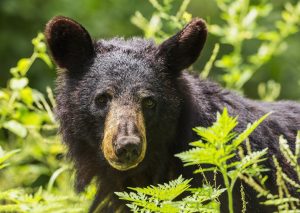Carly Sponarski, Wildlife, Fisheries, and Conservation Biology, UMaine
 Humans are the underlying factor in conflicts concerning how wildlife should be managed (Manfredo, Teel, & Bright, 2003). For management planning to be effective, government agencies require an understanding of how different human populations (i.e., interest groups) (a) interact, (b) value, and (c) are affected by and affect wildlife populations (Fleishman et al., 2011; Mascia et al., 2003). The management of a species, such as black bear, can cause different interest groups to disagree about appropriate management protocols (Gore & Knuth, 2009). These conflicts arise because each group has diverse attitudes toward acceptable management strategies (Decker & Bath, 2010; Koichi, Cottrell, Sangha, & Gordon, 2013). Conflicting values concerning wildlife management can also be highly emotional due to more commonly researched cognitions and experiences. However, a relatively new area of study is that of emotions as they relate to human-wildlife interactions. Emotions have been stated as the heart of human attraction to, and conflict over, wildlife (Jacobs, Vaske, Dubois, & Fehres, 2014; Jacobs, Vaske, & Roemer, 2012) and the findings in this area of research are fragmented and limited at best. This research into emotions is much needed since traditional cognitive models using value orientations, attitudes, beliefs and behavioral intentions can only explain about 50% of the variability in people’s approval or disapproval of a management action such as lethal control (Johansson, Karlsson, Pedersen, & Flykt, 2012). Previous research in HD has focused on the cognitive component of attitudes (e.g., the belief a person has about something which may or may not be based on fact) (Sponarski et al. 2015). Exploring emotions could explain a portion of the other 50% of the variability left to be explained.
Humans are the underlying factor in conflicts concerning how wildlife should be managed (Manfredo, Teel, & Bright, 2003). For management planning to be effective, government agencies require an understanding of how different human populations (i.e., interest groups) (a) interact, (b) value, and (c) are affected by and affect wildlife populations (Fleishman et al., 2011; Mascia et al., 2003). The management of a species, such as black bear, can cause different interest groups to disagree about appropriate management protocols (Gore & Knuth, 2009). These conflicts arise because each group has diverse attitudes toward acceptable management strategies (Decker & Bath, 2010; Koichi, Cottrell, Sangha, & Gordon, 2013). Conflicting values concerning wildlife management can also be highly emotional due to more commonly researched cognitions and experiences. However, a relatively new area of study is that of emotions as they relate to human-wildlife interactions. Emotions have been stated as the heart of human attraction to, and conflict over, wildlife (Jacobs, Vaske, Dubois, & Fehres, 2014; Jacobs, Vaske, & Roemer, 2012) and the findings in this area of research are fragmented and limited at best. This research into emotions is much needed since traditional cognitive models using value orientations, attitudes, beliefs and behavioral intentions can only explain about 50% of the variability in people’s approval or disapproval of a management action such as lethal control (Johansson, Karlsson, Pedersen, & Flykt, 2012). Previous research in HD has focused on the cognitive component of attitudes (e.g., the belief a person has about something which may or may not be based on fact) (Sponarski et al. 2015). Exploring emotions could explain a portion of the other 50% of the variability left to be explained.
Dr. Sponarski joined the Department of Wildlife, Fisheries, and Conservation Biology in August 2016. Prior to moving to Orono, Dr. Sponarski was a postdoctoral scholar in Dr. Nicole Ardoin’s Social Ecology lab at Stanford University. She obtained her PhD from Memorial University of Newfoundland in St. John’s, Canada, in Natural Resource Management within the Geography Department; a M.E.Des (Environmental Science) from the University of Calgary in the Faculty of Environmental Design; and a BSc in Animal Biology from the University of British Columbia.
Dr. Sponarski’s research interests focus on the intersection of human (social systems) and natural resources (ecological systems), thus her work is interdisciplinary in nature. At this intersection, she examines the social impacts of resource management – the community interactions, associated conflicts, and decision-making. This research is called, human dimensions of natural resources and she focuses on wildlife and fisheries management issues. Dr. Sponarski is interested in understanding future management directives/objectives, current management strengths/weaknesses, and public opinion towards difference species and management actions.

